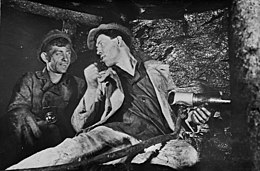
The Stakhanovite movement was a mass cultural movement for workers established by the Communist Party in the 1930s Soviet Union. (Russian: стаха́новское движе́ние, romanized: stakhánovskoye dvizhéniye). Its promoters encouraged the rationalization of workplace processes—i.e., increased production goals—while promoting socialist emulation.
The Stakhanovites modeled themselves after the mythic productivity of the Russian coal miner Alexei Stakhanov. (Russian: стаха́новцы, romanized: stakhánovtsy). As frontline workers they took pride in their aspirations to work harder and more efficiently than was required by ad hoc norms; thereby they saw themselves as contributing to the common good and strengthening the socialist state. The Party started the 'movement' in the coal industry and then applied it to other industries across the Soviet Union. Initially popular, it eventually encountered resistance as the pressures for greater productivity placed increased and unrealistic demands on workers.